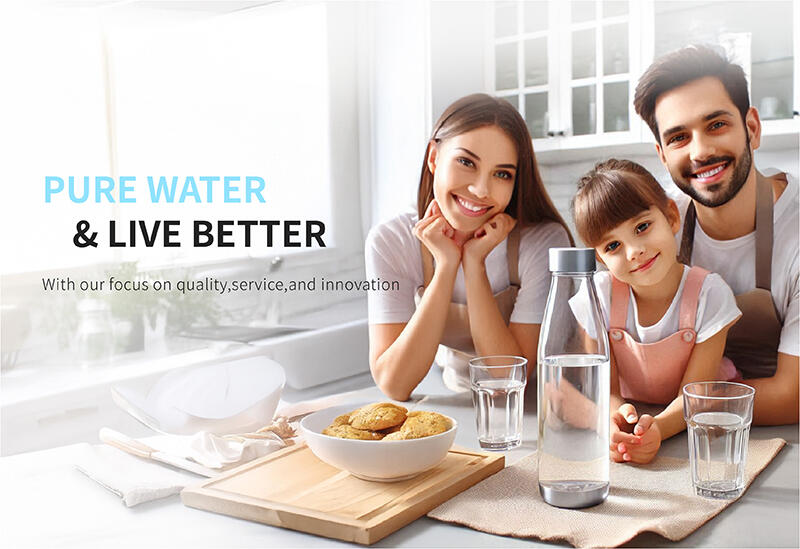Pros and Cons of Reverse Osmosis Water
As awareness of health and drinking water safety grows, various types of water filtration systems have become increasingly popular, with reverse osmosis water purifiers emerging as a top choice for many households and offices. But what is reverse osmosis water? Is it really better than regular tap water? This article will explore the principles behind reverse osmosis and provide a detailed analysis of the pros and cons of reverse osmosis water, helping readers evaluate whether a reverse osmosis filtration system is suitable for their needs.
What Is Reverse Osmosis Water?
Reverse osmosis water is a type of drinking water that has undergone an extremely fine filtration process based on the principles of reverse osmosis technology. This method utilizes a special semi-permeable membrane with extremely tiny pores, which only allow water molecules to pass through while effectively blocking larger substances such as bacteria, viruses, heavy metals, salts, and other dissolved impurities.
During the RO process, water containing impurities is pressurized, forcing the water through this membrane. Pure water flows to one side, while the rejected impurities are discharged with the wastewater.
RO systems often incorporate additional pre- and post-treatment stages, such as sediment filters to remove larger particles, carbon filters to eliminate organic compounds and chlorine, and post-filter polishing to enhance taste and odor. The result is water that meets stringent quality standards, surpassing the purity of conventional tap or bottled water.
What Are the Advantages of Reverse Osmosis Water?
Effective Removal of Chemical Contaminants
Reverse osmosis technology can effectively remove common chemical contaminants from water, including fluoride, chlorine, arsenic, mercury, lead, asbestos, nitrates, perchlorate, and chromium-6, among others. Long-term ingestion of these substances can pose potential health threats. For example, heavy metals like lead and mercury can damage the nervous system or kidneys, while arsenic is linked to cancer.
Filters out Bacteria and Viruses
The pores of the reverse osmosis membrane are extremely small, allowing it to effectively block most bacteria, viruses, and other microorganisms from entering the drinking water. For households with young children, elderly members, or individuals with weaker immune systems, choosing RO-purified water can help reduce the risk of waterborne illnesses and provide an added layer of safety for the whole family.
Removes Unpleasant Odors and Tastes
The taste of chlorine or rust in tap water, or lingering odors from old pipes, are common sources of discomfort for many when drinking water. Reverse osmosis filtration systems can effectively eliminate these undesirable tastes and smells, making the water taste fresher and smoother. For individuals who are not fond of drinking water, improved water quality can naturally make it easier to cultivate a daily hydration habit, contributing to better overall health.
Reduces Plastic Bottle Usage
Having an RO reverse osmosis water filter installed at home provides access to purified drinking water at any time, significantly reducing reliance on bottled water. This not only saves money on long-term purchases of bottled water but also decreases the use of plastic bottles, contributing positively to environmental sustainability.
What Are the Disadvantages of Reverse Osmosis Water?
Beneficial Minerals Are Also Removed
While reverse osmosis systems are effective at filtering out harmful substances, they also remove beneficial natural minerals in water, such as magnesium, calcium, zinc, selenium, iodine, molybdenum, and boron. These minerals play important roles in maintaining body functions, bone health, and immune system support. However, most people today can obtain sufficient minerals through a balanced diet, so the lack of minerals in drinking water is generally not a major concern.
The Filtration Process Produces Wastewater
Traditional RO water purifiers generate a significant amount of wastewater during the filtration process. For every cup of purified water produced, about 2 to 3 cups of wastewater are discarded, leading to concerns about water waste. However, with advances in technology, the latest direct-flow RO systems have greatly improved this issue. The ratio of purified water to wastewater can now reach 1:0.8, significantly reducing wastewater production and making the process more environmentally friendly and efficient.
Higher Installation and Maintenance Costs
The initial installation cost of an RO reverse osmosis system is usually higher than that of standard water filters, and the filters themselves need to be replaced regularly to maintain effective filtration.
Consumers are strongly encouraged to assess their household budget and daily needs—especially considering the long-term health benefits, improved water quality, and overall convenience that an RO system can provide. For households with high water consumption, strict standards for water purity or areas with worse water quality, investing in an RO system is not just reasonable—it’s a smart and worthwhile decision.
Conclusion
In conclusion, reverse osmosis water is regarded as a leading modern water purification technology, offering high-quality drinking water for daily use. It performs exceptionally well in removing harmful substances and improving the taste of water, making it particularly suitable for households in areas with poor water quality or for those with higher standards for drinking water.
Although concerns about mineral loss and wastewater generation still exist, advances in technology have significantly reduced wastewater output. As for minerals, essential minerals can be easily supplemented through a balanced diet, so the impact of these disadvantages is not as severe as often imagined. By carefully considering the pros and cons of reverse osmosis water—along with household budget, water usage habits, and health requirements—consumers can choose the most appropriate water purification solution to improve their overall quality of life.
LAN SHAN is a professional manufacturer specializing in residential, commercial, and industrial RO systems and equipment, as well as related RO components. The company is committed to providing customers with reliable and efficient reverse osmosis water filtration systems, with a product range that meets the diverse needs of residential, commercial, and industrial clients worldwide. For those seeking RO water solutions, LAN SHAN offers professional assistance to help create a healthy drinking water environment.




